2021-2022学年牛津译林版英语八年级上册Unit 1 Friends复习课件(共27张PPT)
文档属性
| 名称 | 2021-2022学年牛津译林版英语八年级上册Unit 1 Friends复习课件(共27张PPT) |  | |
| 格式 | zip | ||
| 文件大小 | 33.2MB | ||
| 资源类型 | 教案 | ||
| 版本资源 | 牛津译林版 | ||
| 科目 | 英语 | ||
| 更新时间 | 2021-09-14 14:43:31 | ||
图片预览

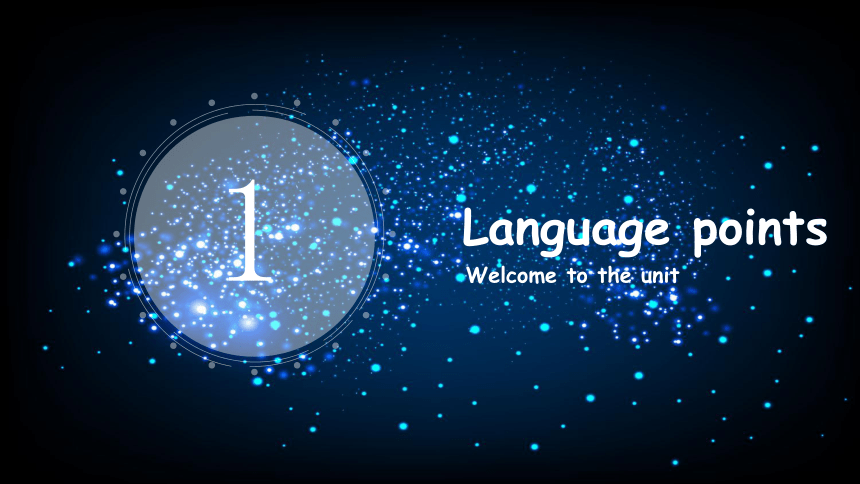
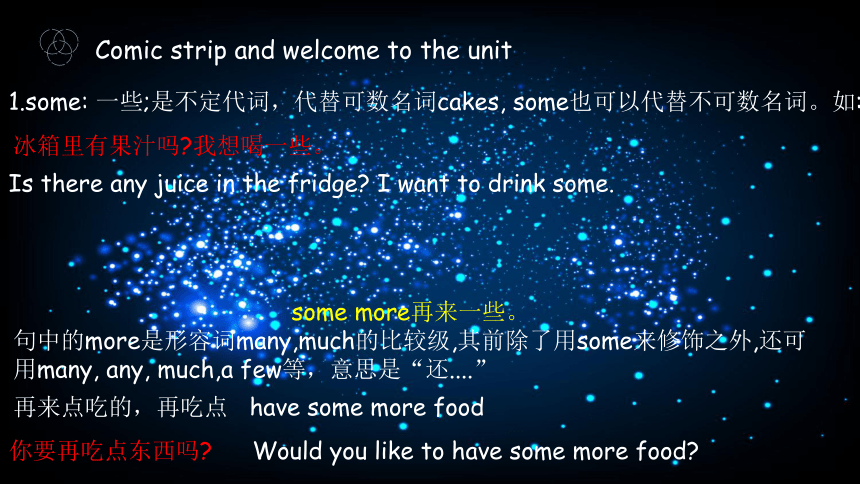
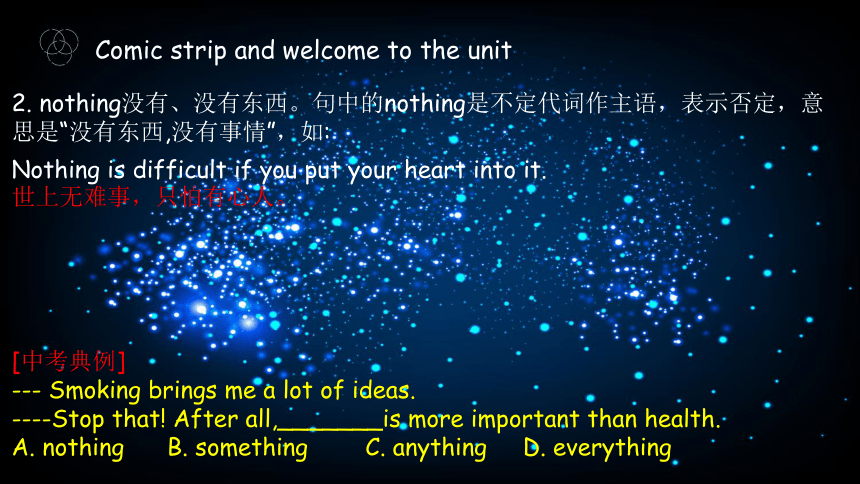
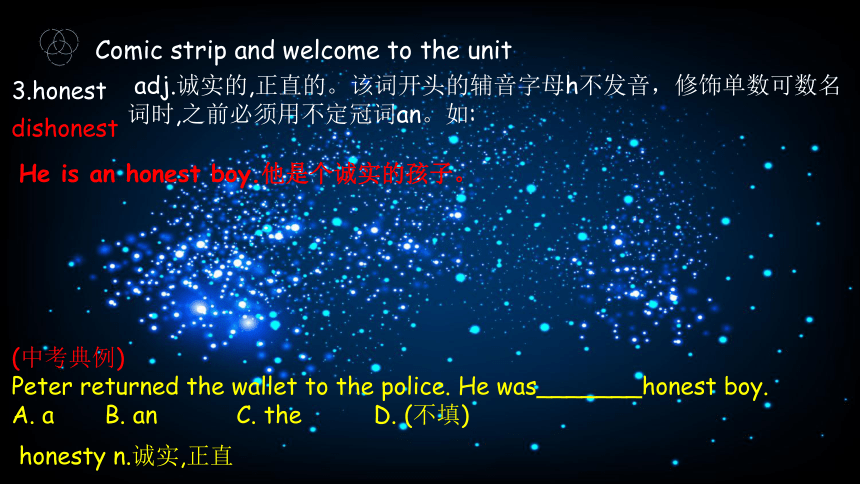
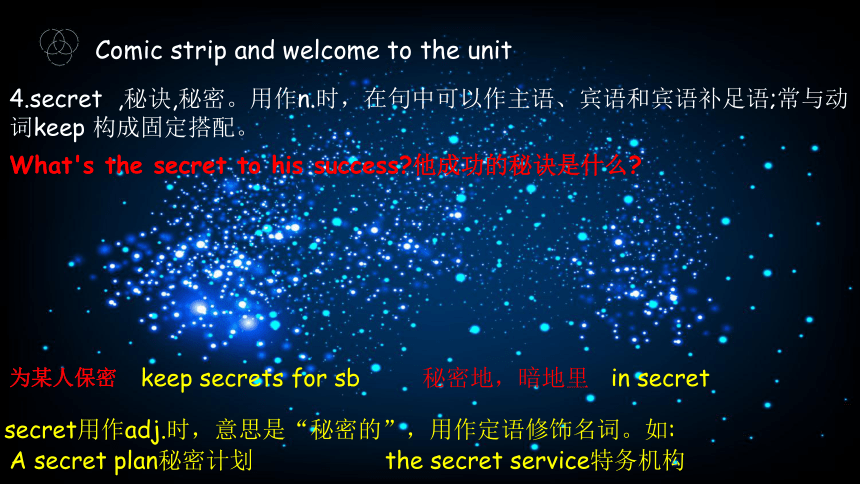
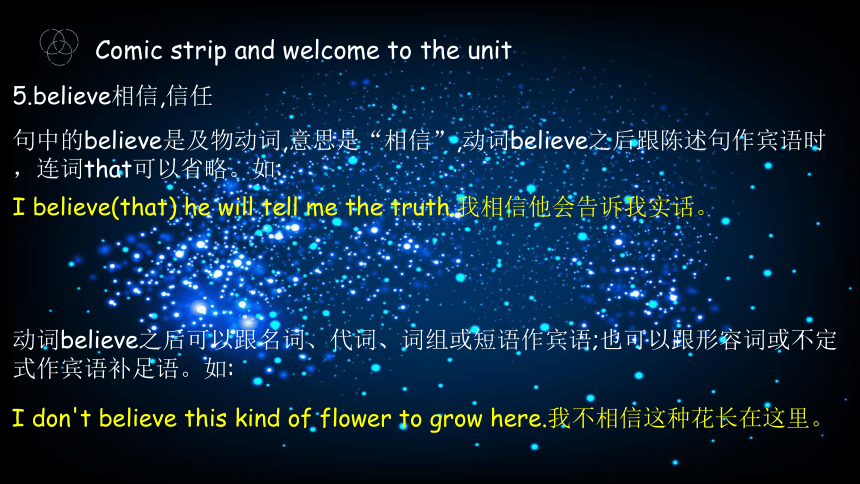

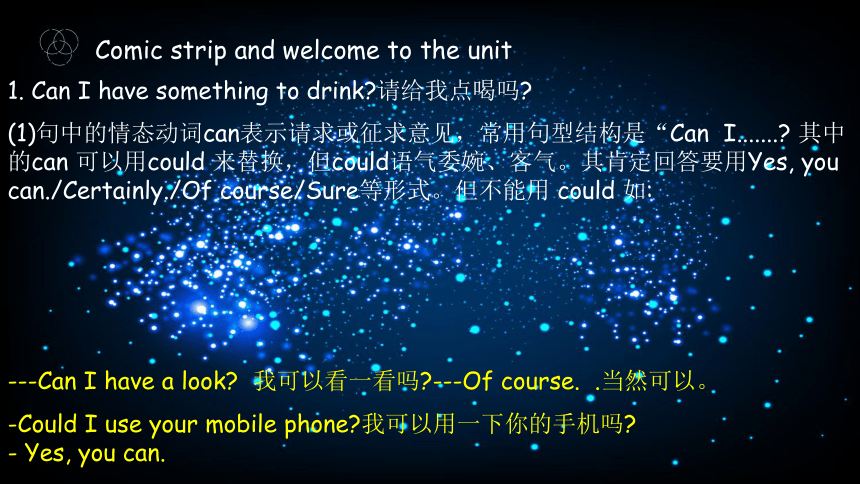
文档简介
(共27张PPT)
8A
Unit
1
复习
1
Language
points
Welcome
to
the
unit
Comic
strip
and
welcome
to
the
unit
1.some:
一些;是不定代词,代替可数名词cakes,
some也可以代替不可数名词。如:
冰箱里有果汁吗?我想喝一些。
Is
there
any
juice
in
the
fridge?
I
want
to
drink
some.
some
more再来一些。
句中的more是形容词many,much的比较级,其前除了用some来修饰之外,还可用many,
any,
much,a
few等,意思是“还....”
再来点吃的,再吃点
have
some
more
food
你要再吃点东西吗?
Would
you
like
to
have
some
more
food?
Comic
strip
and
welcome
to
the
unit
2.
nothing没有、没有东西。句中的nothing是不定代词作主语,表示否定,意思是“没有东西,没有事情”,如:
Nothing
is
difficult
if
you
put
your
heart
into
it.
世上无难事,只怕有心人。
[中考典例]
---
Smoking
brings
me
a
lot
of
ideas.
----Stop
that!
After
all,_______is
more
important
than
health.
A.
nothing
B.
something
C.
anything
D.
everything
Comic
strip
and
welcome
to
the
unit
3.honest
adj.诚实的,正直的。该词开头的辅音字母h不发音,修饰单数可数名词时,之前必须用不定冠词an。如:
dishonest
He
is
an
honest
boy.他是个诚实的孩子。
(中考典例)
Peter
returned
the
wallet
to
the
police.
He
was_______honest
boy.
A.
a
B.
an
C.
the
D.
(不填)
honesty
n.诚实,正直
4.secret
,秘诀,秘密。用作n.时,在句中可以作主语、宾语和宾语补足语;常与动词keep
构成固定搭配。
Comic
strip
and
welcome
to
the
unit
What's
the
secret
to
his
success?他成功的秘诀是什么?
keep
secrets
for
sb
为某人保密
秘密地,暗地里
in
secret
secret用作adj.时,意思是“秘密的”,用作定语修饰名词。如:
A
secret
plan秘密计划
the
secret
service特务机构
Comic
strip
and
welcome
to
the
unit
5.believe相信,信任
句中的believe是及物动词,意思是“相信”,动词believe之后跟陈述句作宾语时,连词that可以省略。如:
I
believe(that)
he
will
tell
me
the
truth.我相信他会告诉我实话。
动词believe之后可以跟名词、代词、词组或短语作宾语;也可以跟形容词或不定式作宾语补足语。如:
I
don't
believe
this
kind
of
flower
to
grow
here.我不相信这种花长在这里。
2
难句解读
welcome
to
the
unit
Comic
strip
and
welcome
to
the
unit
1.
Can
I
have
something
to
drink?请给我点喝吗?
(1)句中的情态动词can表示请求或征求意见,常用句型结构是“Can
I.......?
其中的can
可以用could
来替换,但could语气委婉、客气。其肯定回答要用Yes,
you
can./Certainly./Of
course/Sure等形式。但不能用
could
如:
---Can
I
have
a
look?
我可以看一看吗?---Of
course.
.当然可以。
-Could
I
use
your
mobile
phone?我可以用一下你的手机吗?
-
Yes,
you
can.
Comic
strip
and
welcome
to
the
unit
(2)have
something
to
drink意为“喝点东西”。其中的to
drink是不定式作定语修饰something.修饰不定代词的不定式形容词或介词短语必须后置。在这个结构中不定式之前还可以用形容词来修饰不定代词,如:
Would
you
like
to
have
something
to
drink?你想喝点东西吗?
There's
something
wrong
with
my
computer.我的电脑出毛病了。
通常在疑问句中用anything来表示,但是在Can
I....
/Would
you
like..等句型中表示征求意见或希望得到肯定的答复时用something。如:
Do
you
find
anything
in
her
bag?你在她包里发现什么了吗?
Would
you
like
something
to
eat?你想吃点什么吗?
Could
you
give
me
something
interesting
to
read?你能给我一些有趣的东西看吗?
[中考典例]
---Is
there
____________in
today's
newspaper?
---Yes,quite
a
lot.
A.
anything
interesting
B.
something
interesting
C.
interesting
anything
D.
interesting
something
Comic
strip
and
welcome
to
the
unit
2.What
about
some
milk?
来些牛奶如何?
该句型用来征求对方意见.提建议或询问消息。其结构相当于How
about..介词about之后可以跟名词、代词或v.+ing形式作宾语。如:
What
a
nice
day!
What
about
going
out
for
a
picnic?
多么好的天气啊!出去野餐怎么样?
My
brother
is
fifteen
years
old.
What
about
your
brother?
我哥哥15岁。你哥哥呢?
[中考典例)
How
about
telling
stories
to
cheer
up
the
sick
kids?
(改为同义句)
__________
___________tell
stories
to
cheer
up
the
sick
kids?
3
language
points
Reading
1.
willing愿意。。句中的willing是形容词,意思是“情愿的,乐意的”。be
willing
to
do
sth乐意做某事,相当于be
ready
to
do
sth。如:
我愿意和你一起分享我的快乐。
I'm
willing
to
share
with
you
my
joy.
2.voice是可数名词,意为“嗓音”。如:
我们的声音在空屋里回荡。
Our
voices
echoed
in
the
empty
house.
[辨异]voice,noise与sound
voice意思是“嗓音”指人或动物特有的嗓音;
noise指吵闹、喧哗声往往是不和谐的、不悦耳的声音。
sound表示“声音”;指人所能听到的任何声音。
Reading
3.almost作副词,意为“几乎,差不多”。一般置于实义动词之前,系动词、助动词和情态动词之后。如:
We
were
late,
and
almost
missed
the
train.我们迟到了,差点误了那趟火车。
[中考典例]
---
How
is
Susan?一Oh,I______
see
her
because
she
lives
abroad.
A.
always
B.
often
C.
almost
D.
hardly
Reading
4.sense句中的sense是名词,意思是“感觉”。如:
the
sense
of
sight/
hearing/smell/
taste/
touch视/听/嗅/味/触觉
have
a
sense
of
sth是固定搭配,意思是“对某事有感觉”。既可表达对事物的生理感觉,也可表达对事物的觉察和觉悟。如:
The
blind
girl
has
a
keen
sense
of
hearing.这盲女孩的听觉很灵敏。
【中考典例】
Tom
will
be
able
to
find
the
hotel,
he
has
a
pretty
good__________of
direction.
A.
idea
B.
feeling
C.
experience
D.
sense
Reading
5.bored是形容词,意思是“无聊的”。作动词feel的表语。如:
She
felt
bored
at
home
herself.她独自在家感到无聊。
[辨异]bored与boring
bored是过去分词,作形容词,常跟在连系动词后面作表语。指人所处的状态,意为“感到厌倦”,修饰人。boring也是形容词。它常常指事物的性质,意为“令人厌倦的,无聊的”。可直接放在名词前面作定语,也可跟在连系动词后面作表语。如:
The
lesson
was
boring,
and
the
students
were
bored.
这堂课枯燥无味,学生们感到乏味。
拓展类似用法的词有很多。如:interesting/
interested;
exciting/excited;surprising/
surprised;
amazing/
amazed等。
[中考典例]
The
work
is
_______,so
I
often
feel______.
A.
bored,
boring
B.
boring,
boring
C.
boring,
bored
D.
bored,
bored
Reading
6.fit在课文中作动词,意为“可容纳,装进”,还可表示“适合",作为形容词。fit常与副词well搭配。如:
我的狗一天天地长大。这个地方不适合它了。
My
dog
is
growing
up
day
by
day.
This
place
is
not
fit
for
it.
这双鞋子我穿不合适。
This
pair
of
shoes
doesn't
fit
me
well.
7.sweet此处为形容词,意为“可爱的,惹人喜爱的”,在句中可作表语或定语.如:
Mary
is
a
sweet
girl.
玛丽是一个可爱的女孩。
The
dish
tastes
a
bit
sweet.这菜有点甜味。
[中考典例]
---What
do
you
think
of
the
woman
singer?
---Her
voice
sounds_________.I
like
her
songs.
A.
sweet
B.sweetly
C.
bad
D.
badly
Reading
4
难句解读
Reading
Reading
1.Betty
is
one
of
my
best
friends.贝蒂是我最好的朋友之一。
(1)one
of后可接可数名词复数或代词宾格,意为“其中之一”。one是代词,指代同类事物中的一个。例如:
这些苹果你可以随便拿一个。
You
may
take
any
one
of
these
apples.
(2)名词被形容词修饰时,跟在one
of后面的形容词常用最高级形式;构成句型是“one
of十形容词最高级+名词复数/代词复数”,意为“最.....的....”此结构做主语时,谓语动词用单数形式。
One
of
the
tallest
boys
is
my
brother.那些最高的男孩中的一个是我的哥哥。
(3)此结构中的最高级前还可以用物主代词或名词所有格来替换the。例如:
这是我父亲最有用的字典中的一本。
This
is
one
of
my
father's
most
useful
dictionaries.
[中考典例]
Edison
is
one
of
the
greatest________(发明家)
in
the
world.
---
Do
you
know
that
China
is
one
of
________
countries
in
the
world?
----Yes,I
do.
It's
much
_______than
the
US.
A.
oldest;older
B.
the
oldest;
older
C.
the
oldest;
elder
D.
the
older;elder
Reading
2....
and
ready
to
help
people
anytime.她在任何时候都愿意帮助别人。
be
ready
to
do
sth(乐意做某事)是固定搭配,相当于be
willing
to
do
sth。
如
刘梅总是乐意帮助我学功课。
Liu
Mei
is
always
ready
to
help
me
with
my
lessons.
(=
Liu
Mei
is
always
willing
to
help
me
with
my
lessons.)
ready
可以作“准备好的,有准备的”讲。常见的短语有:be/get
ready
to
do
sth准备做某事;
be/get
ready
for
sth为某事做准备,(
=
prepare
for
sth);get
sth
ready准备好某物。如:
晚会已经准备就绪。Everything
is
ready
for
the
party.
他们准备出发了。
They
are
ready
to
leave.
我们正在为这次考试做准备。
We
are
getting
ready
for
the
coming
exam.
[中考典例]----Why
does
everyone
like
that
boy?
--Because
he__________(总是乐于助人).
(ready)
Reading
3.
She
helps
me
with
my
homework
and
she
always
gives
her
seat
on
the
bus
to
someone
in
need.她经常帮助我完成家庭作业,她在公车上也经常让座给有需要的人。
这个句子是由and连接的一个并列句,掌握如下短语:
(1)"help
sb
with
sth"意为“帮助某人做某事”。如:1
often
help
my
sister
with
English.
我经常帮助我妹妹学英语。如果后面跟的是动词,可以说成“help
sb
(to)
do
sth",意为“帮助某人做某事”。如:
我经常帮助我妹妹学习英语。
I
often
help
my
sister
(to)
learn
English.
(2)“give
one's
seat
to
sb"意为“让座给某人”。如:
今天他在阅览室给位老人让座。
He
gave
his
seat
to
an
old
man
in
the
reading
room
today.
Reading
seat构成的相关词组有:
take
a
seat
/be
seated=
sit
down坐下。如:
他坐在杰克和我之间。
He
is
seated
/takes
a
seat
/sit
down
between
Jack
and
me.
(3)in
need意为“有需求的,处于需求状态的”。如:
患难朋友才是真正的朋友。
A
friend
in
need
is
a
friend
in
deed.
In
need
of
sh/sb意为“需要某事或某人”
Reading
4.
She
wants
to
be
a
singer
when
she
grows
up.她长大后想做一名歌手。
(1)want
to
do
sth意为“想要做某事”,want后跟动词时,要用动词的不定式形式。此外,want还可用作及物动词,后直接跟名词或代词作宾语。如:
你没必要相信所听到的一切事情。
You
don't
want
to
believe
everything
you
hear.
(2)when引导的时间状语从句
句中的when作连词。意为“...的时候”,引导时间状语从句,说明主句谓语动作发生的时间。when引导的时间状语从句可位于主句之前,也可位于主句之后。
[易错警醒]
在时间状语从句或条件状语,从句中的动词表示的是将来的动作时,要注意从句中时态的转移,即用一般现在时代替一般将来时。如:
Please
send
an
e
mail
to
me
after
you
arrive
in
the
USA.
在你到达美国以后给我发个电子邮件。
假如明天下雨,我们就不举行运动会了。
If
it
rains
tomorrow,
we
won't
hold
the
sports
meeting,
Reading
5.He
wears
small
round
glasses.They
make
him
look
smart.,他戴着一副小圆眼镜,这使他看上去很机灵。
后面一句中的“make
him
look
smart'是复合宾语结构,make后面的不定式不带'to'。后面接不带to的动词不定式作宾语补足语的动词还有:let,
see,
hear
,
watch,have等。如:
我们经常看到他在操场上踢足球。We
often
see
him
play
football
in
the
playground.
他让我独自完成这工作。
He
had
me
finish
the
work
by
myself.
使役动词和感官动词通常要求用不带to的不定式作宾语补足语,help后面的动词可以加to也可以不加to。
[中考典例]
We
need
to
make
more
young
people______
(learn)
Shadow
Play
so
that
it
won't
disappear
in
China.
5
exercises
Translations
1.
什么使我们的朋友如此特别?
2.
我也渴了,我能再喝一点水吗?
3.
她和别人交谈时有困难吗?
4.
当有事使我烦恼时,我总是想去找她。
5.
他的大长腿在课桌底下伸不开。
What
makes
our
friends
so
special?
I
am
thirty
too.
Can
I
have
a
little
more
water?
Does
she
have
problems
talking
with
others?
When
something
worries
me
,
I
always
want
to
go
to
her.
His
long
legs
don't
fit
well
under
his
desk.
Thank
you
for
your
listening
8A
Unit
1
复习
1
Language
points
Welcome
to
the
unit
Comic
strip
and
welcome
to
the
unit
1.some:
一些;是不定代词,代替可数名词cakes,
some也可以代替不可数名词。如:
冰箱里有果汁吗?我想喝一些。
Is
there
any
juice
in
the
fridge?
I
want
to
drink
some.
some
more再来一些。
句中的more是形容词many,much的比较级,其前除了用some来修饰之外,还可用many,
any,
much,a
few等,意思是“还....”
再来点吃的,再吃点
have
some
more
food
你要再吃点东西吗?
Would
you
like
to
have
some
more
food?
Comic
strip
and
welcome
to
the
unit
2.
nothing没有、没有东西。句中的nothing是不定代词作主语,表示否定,意思是“没有东西,没有事情”,如:
Nothing
is
difficult
if
you
put
your
heart
into
it.
世上无难事,只怕有心人。
[中考典例]
---
Smoking
brings
me
a
lot
of
ideas.
----Stop
that!
After
all,_______is
more
important
than
health.
A.
nothing
B.
something
C.
anything
D.
everything
Comic
strip
and
welcome
to
the
unit
3.honest
adj.诚实的,正直的。该词开头的辅音字母h不发音,修饰单数可数名词时,之前必须用不定冠词an。如:
dishonest
He
is
an
honest
boy.他是个诚实的孩子。
(中考典例)
Peter
returned
the
wallet
to
the
police.
He
was_______honest
boy.
A.
a
B.
an
C.
the
D.
(不填)
honesty
n.诚实,正直
4.secret
,秘诀,秘密。用作n.时,在句中可以作主语、宾语和宾语补足语;常与动词keep
构成固定搭配。
Comic
strip
and
welcome
to
the
unit
What's
the
secret
to
his
success?他成功的秘诀是什么?
keep
secrets
for
sb
为某人保密
秘密地,暗地里
in
secret
secret用作adj.时,意思是“秘密的”,用作定语修饰名词。如:
A
secret
plan秘密计划
the
secret
service特务机构
Comic
strip
and
welcome
to
the
unit
5.believe相信,信任
句中的believe是及物动词,意思是“相信”,动词believe之后跟陈述句作宾语时,连词that可以省略。如:
I
believe(that)
he
will
tell
me
the
truth.我相信他会告诉我实话。
动词believe之后可以跟名词、代词、词组或短语作宾语;也可以跟形容词或不定式作宾语补足语。如:
I
don't
believe
this
kind
of
flower
to
grow
here.我不相信这种花长在这里。
2
难句解读
welcome
to
the
unit
Comic
strip
and
welcome
to
the
unit
1.
Can
I
have
something
to
drink?请给我点喝吗?
(1)句中的情态动词can表示请求或征求意见,常用句型结构是“Can
I.......?
其中的can
可以用could
来替换,但could语气委婉、客气。其肯定回答要用Yes,
you
can./Certainly./Of
course/Sure等形式。但不能用
could
如:
---Can
I
have
a
look?
我可以看一看吗?---Of
course.
.当然可以。
-Could
I
use
your
mobile
phone?我可以用一下你的手机吗?
-
Yes,
you
can.
Comic
strip
and
welcome
to
the
unit
(2)have
something
to
drink意为“喝点东西”。其中的to
drink是不定式作定语修饰something.修饰不定代词的不定式形容词或介词短语必须后置。在这个结构中不定式之前还可以用形容词来修饰不定代词,如:
Would
you
like
to
have
something
to
drink?你想喝点东西吗?
There's
something
wrong
with
my
computer.我的电脑出毛病了。
通常在疑问句中用anything来表示,但是在Can
I....
/Would
you
like..等句型中表示征求意见或希望得到肯定的答复时用something。如:
Do
you
find
anything
in
her
bag?你在她包里发现什么了吗?
Would
you
like
something
to
eat?你想吃点什么吗?
Could
you
give
me
something
interesting
to
read?你能给我一些有趣的东西看吗?
[中考典例]
---Is
there
____________in
today's
newspaper?
---Yes,quite
a
lot.
A.
anything
interesting
B.
something
interesting
C.
interesting
anything
D.
interesting
something
Comic
strip
and
welcome
to
the
unit
2.What
about
some
milk?
来些牛奶如何?
该句型用来征求对方意见.提建议或询问消息。其结构相当于How
about..介词about之后可以跟名词、代词或v.+ing形式作宾语。如:
What
a
nice
day!
What
about
going
out
for
a
picnic?
多么好的天气啊!出去野餐怎么样?
My
brother
is
fifteen
years
old.
What
about
your
brother?
我哥哥15岁。你哥哥呢?
[中考典例)
How
about
telling
stories
to
cheer
up
the
sick
kids?
(改为同义句)
__________
___________tell
stories
to
cheer
up
the
sick
kids?
3
language
points
Reading
1.
willing愿意。。句中的willing是形容词,意思是“情愿的,乐意的”。be
willing
to
do
sth乐意做某事,相当于be
ready
to
do
sth。如:
我愿意和你一起分享我的快乐。
I'm
willing
to
share
with
you
my
joy.
2.voice是可数名词,意为“嗓音”。如:
我们的声音在空屋里回荡。
Our
voices
echoed
in
the
empty
house.
[辨异]voice,noise与sound
voice意思是“嗓音”指人或动物特有的嗓音;
noise指吵闹、喧哗声往往是不和谐的、不悦耳的声音。
sound表示“声音”;指人所能听到的任何声音。
Reading
3.almost作副词,意为“几乎,差不多”。一般置于实义动词之前,系动词、助动词和情态动词之后。如:
We
were
late,
and
almost
missed
the
train.我们迟到了,差点误了那趟火车。
[中考典例]
---
How
is
Susan?一Oh,I______
see
her
because
she
lives
abroad.
A.
always
B.
often
C.
almost
D.
hardly
Reading
4.sense句中的sense是名词,意思是“感觉”。如:
the
sense
of
sight/
hearing/smell/
taste/
touch视/听/嗅/味/触觉
have
a
sense
of
sth是固定搭配,意思是“对某事有感觉”。既可表达对事物的生理感觉,也可表达对事物的觉察和觉悟。如:
The
blind
girl
has
a
keen
sense
of
hearing.这盲女孩的听觉很灵敏。
【中考典例】
Tom
will
be
able
to
find
the
hotel,
he
has
a
pretty
good__________of
direction.
A.
idea
B.
feeling
C.
experience
D.
sense
Reading
5.bored是形容词,意思是“无聊的”。作动词feel的表语。如:
She
felt
bored
at
home
herself.她独自在家感到无聊。
[辨异]bored与boring
bored是过去分词,作形容词,常跟在连系动词后面作表语。指人所处的状态,意为“感到厌倦”,修饰人。boring也是形容词。它常常指事物的性质,意为“令人厌倦的,无聊的”。可直接放在名词前面作定语,也可跟在连系动词后面作表语。如:
The
lesson
was
boring,
and
the
students
were
bored.
这堂课枯燥无味,学生们感到乏味。
拓展类似用法的词有很多。如:interesting/
interested;
exciting/excited;surprising/
surprised;
amazing/
amazed等。
[中考典例]
The
work
is
_______,so
I
often
feel______.
A.
bored,
boring
B.
boring,
boring
C.
boring,
bored
D.
bored,
bored
Reading
6.fit在课文中作动词,意为“可容纳,装进”,还可表示“适合",作为形容词。fit常与副词well搭配。如:
我的狗一天天地长大。这个地方不适合它了。
My
dog
is
growing
up
day
by
day.
This
place
is
not
fit
for
it.
这双鞋子我穿不合适。
This
pair
of
shoes
doesn't
fit
me
well.
7.sweet此处为形容词,意为“可爱的,惹人喜爱的”,在句中可作表语或定语.如:
Mary
is
a
sweet
girl.
玛丽是一个可爱的女孩。
The
dish
tastes
a
bit
sweet.这菜有点甜味。
[中考典例]
---What
do
you
think
of
the
woman
singer?
---Her
voice
sounds_________.I
like
her
songs.
A.
sweet
B.sweetly
C.
bad
D.
badly
Reading
4
难句解读
Reading
Reading
1.Betty
is
one
of
my
best
friends.贝蒂是我最好的朋友之一。
(1)one
of后可接可数名词复数或代词宾格,意为“其中之一”。one是代词,指代同类事物中的一个。例如:
这些苹果你可以随便拿一个。
You
may
take
any
one
of
these
apples.
(2)名词被形容词修饰时,跟在one
of后面的形容词常用最高级形式;构成句型是“one
of十形容词最高级+名词复数/代词复数”,意为“最.....的....”此结构做主语时,谓语动词用单数形式。
One
of
the
tallest
boys
is
my
brother.那些最高的男孩中的一个是我的哥哥。
(3)此结构中的最高级前还可以用物主代词或名词所有格来替换the。例如:
这是我父亲最有用的字典中的一本。
This
is
one
of
my
father's
most
useful
dictionaries.
[中考典例]
Edison
is
one
of
the
greatest________(发明家)
in
the
world.
---
Do
you
know
that
China
is
one
of
________
countries
in
the
world?
----Yes,I
do.
It's
much
_______than
the
US.
A.
oldest;older
B.
the
oldest;
older
C.
the
oldest;
elder
D.
the
older;elder
Reading
2....
and
ready
to
help
people
anytime.她在任何时候都愿意帮助别人。
be
ready
to
do
sth(乐意做某事)是固定搭配,相当于be
willing
to
do
sth。
如
刘梅总是乐意帮助我学功课。
Liu
Mei
is
always
ready
to
help
me
with
my
lessons.
(=
Liu
Mei
is
always
willing
to
help
me
with
my
lessons.)
ready
可以作“准备好的,有准备的”讲。常见的短语有:be/get
ready
to
do
sth准备做某事;
be/get
ready
for
sth为某事做准备,(
=
prepare
for
sth);get
sth
ready准备好某物。如:
晚会已经准备就绪。Everything
is
ready
for
the
party.
他们准备出发了。
They
are
ready
to
leave.
我们正在为这次考试做准备。
We
are
getting
ready
for
the
coming
exam.
[中考典例]----Why
does
everyone
like
that
boy?
--Because
he__________(总是乐于助人).
(ready)
Reading
3.
She
helps
me
with
my
homework
and
she
always
gives
her
seat
on
the
bus
to
someone
in
need.她经常帮助我完成家庭作业,她在公车上也经常让座给有需要的人。
这个句子是由and连接的一个并列句,掌握如下短语:
(1)"help
sb
with
sth"意为“帮助某人做某事”。如:1
often
help
my
sister
with
English.
我经常帮助我妹妹学英语。如果后面跟的是动词,可以说成“help
sb
(to)
do
sth",意为“帮助某人做某事”。如:
我经常帮助我妹妹学习英语。
I
often
help
my
sister
(to)
learn
English.
(2)“give
one's
seat
to
sb"意为“让座给某人”。如:
今天他在阅览室给位老人让座。
He
gave
his
seat
to
an
old
man
in
the
reading
room
today.
Reading
seat构成的相关词组有:
take
a
seat
/be
seated=
sit
down坐下。如:
他坐在杰克和我之间。
He
is
seated
/takes
a
seat
/sit
down
between
Jack
and
me.
(3)in
need意为“有需求的,处于需求状态的”。如:
患难朋友才是真正的朋友。
A
friend
in
need
is
a
friend
in
deed.
In
need
of
sh/sb意为“需要某事或某人”
Reading
4.
She
wants
to
be
a
singer
when
she
grows
up.她长大后想做一名歌手。
(1)want
to
do
sth意为“想要做某事”,want后跟动词时,要用动词的不定式形式。此外,want还可用作及物动词,后直接跟名词或代词作宾语。如:
你没必要相信所听到的一切事情。
You
don't
want
to
believe
everything
you
hear.
(2)when引导的时间状语从句
句中的when作连词。意为“...的时候”,引导时间状语从句,说明主句谓语动作发生的时间。when引导的时间状语从句可位于主句之前,也可位于主句之后。
[易错警醒]
在时间状语从句或条件状语,从句中的动词表示的是将来的动作时,要注意从句中时态的转移,即用一般现在时代替一般将来时。如:
Please
send
an
e
to
me
after
you
arrive
in
the
USA.
在你到达美国以后给我发个电子邮件。
假如明天下雨,我们就不举行运动会了。
If
it
rains
tomorrow,
we
won't
hold
the
sports
meeting,
Reading
5.He
wears
small
round
glasses.They
make
him
look
smart.,他戴着一副小圆眼镜,这使他看上去很机灵。
后面一句中的“make
him
look
smart'是复合宾语结构,make后面的不定式不带'to'。后面接不带to的动词不定式作宾语补足语的动词还有:let,
see,
hear
,
watch,have等。如:
我们经常看到他在操场上踢足球。We
often
see
him
play
football
in
the
playground.
他让我独自完成这工作。
He
had
me
finish
the
work
by
myself.
使役动词和感官动词通常要求用不带to的不定式作宾语补足语,help后面的动词可以加to也可以不加to。
[中考典例]
We
need
to
make
more
young
people______
(learn)
Shadow
Play
so
that
it
won't
disappear
in
China.
5
exercises
Translations
1.
什么使我们的朋友如此特别?
2.
我也渴了,我能再喝一点水吗?
3.
她和别人交谈时有困难吗?
4.
当有事使我烦恼时,我总是想去找她。
5.
他的大长腿在课桌底下伸不开。
What
makes
our
friends
so
special?
I
am
thirty
too.
Can
I
have
a
little
more
water?
Does
she
have
problems
talking
with
others?
When
something
worries
me
,
I
always
want
to
go
to
her.
His
long
legs
don't
fit
well
under
his
desk.
Thank
you
for
your
listening
